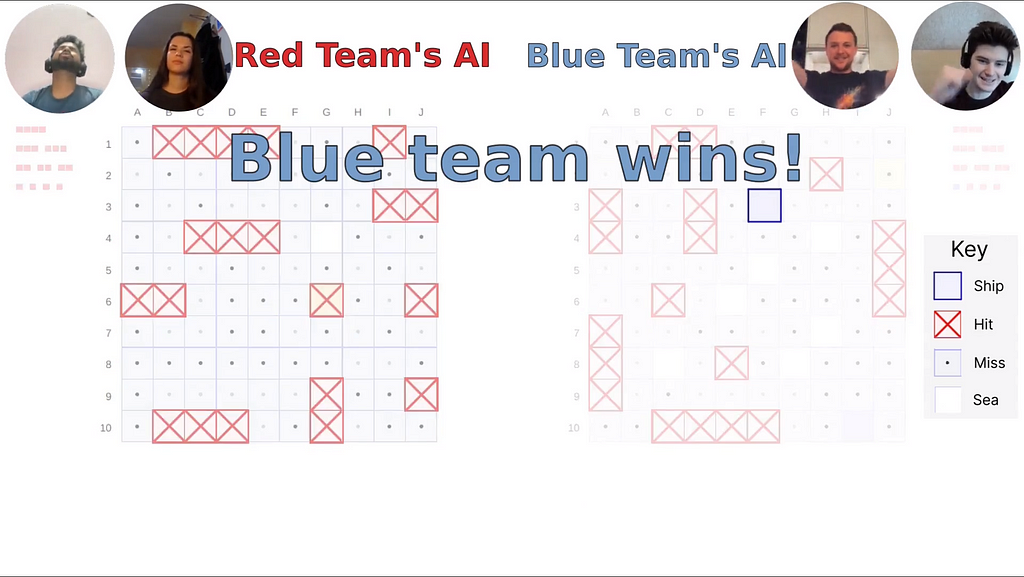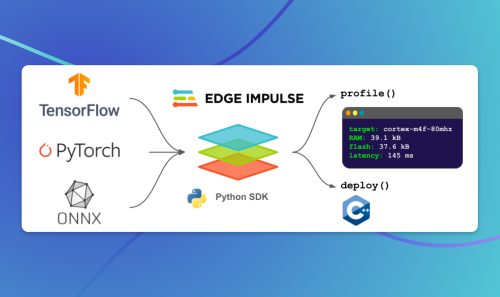
Learning to build machine learning (ML) and AI models by playing games
Last Updated on June 6, 2022 by Editorial Team
Playing games to learn machine learning (ML) and artificial intelligence (AI)
Author(s): Matthew Phillips
Self-paced learning online can be a drag. Especially so when the subject matter is as vast and complex as AI. It’s easy to get stuck in tutorial hell — watching tutorials, but never taking the plunge into building something yourself.
Our startup called Delta Academy is aiming to change that. Rather than video lectures, students learn to build AIs in Python by competing in teams to win live coding challenges, with a final competition.
For example, one challenge is to build an AI that plays the board game Battleships. At the end of the session, the teams’ AI’s play against one another in a knockout competition, with everyone watching the matches on screen. Depending on where the team’s AI finishes, they get a number of points added to the leaderboard. Then it’s time for the discussion. How did the winning solution work? What would the ideal solution be? Why?

Students come away understanding a variety of game AI methods and with a portfolio of coding projects. Our first focus is on building reinforcement learning models. Students get taken from the very basics all the way through to building AIs that conquer famous video games.
Just like in many role-playing games, a learner’s progress over the weeks is shown in a skill tree. This helps students see how subject matter fits together, and see their progress.
Delta combines a peer group, learning by doing, and friendly competition. It’s a fully remote and cohort-based training program. By immediately applying what is learned in a team, students stay accountable and build problem-solving skills. Over a 4-week long program, they build a network of friendships. And they develop the soft skills that are so integral to modern tech roles, such as leadership, communication and ownership.
The first 10 mins of every session starts with a briefing. The students are explained the task of building an AI, and a basic solution is built by an expert live. And then, in teams, learners work together to tackle the challenge. Experts are always on hand to respond to questions and help out. At the end of the session, the code written competes with other teams to determine the winner. A discussion of what the best approaches are and why follows. Ahead of the next session, you’re introduced to the skills you’ll need and given high-quality resources to learn them.
So far, sessions on Connect 4 and Pong have gone down really well. The winning solutions — coded up in 2 hours — included the MinMax algorithm for Connect 4, and predicting the final location of the puck in Pong.
The online program has already been attended by students from over 5 countries. Sessions last for 2 hours, with a winner decided by pitting the AIs written by competitors against each other.
One of the top-rated Universities in the U.K. is an early adopter, using Delta Academy to teach their bioscience undergrads the basics of coding in Python in an intensive 3-day version of the program. Many went from 0 experience in coding to writing code that plays games.
The team behind Delta come from leading research institutions in Artificial Intelligence, including the University of Cambridge, University of Oxford, UCL, Five AI and DeepMind. The program is based on the best learning experiences we’ve had. We draw inspiration from hackathons, project-based classes and bootcamps.
The plan is to grow out from the starting point of teaching basic and intermediate level Python. There is clearly a large need for innovation in developing the talent pipeline for companies. Amid the great resignation and a red-hot jobs market, all of the power lies with talented people with in-demand skills. But currently, most graduates leave university without the required skills. Despite a lot of growth, bootcamps haven’t managed to scale their training programs enough to fill the gaps. In the UK alone, the UK government estimates that companies are recruiting for around 200,000 roles with requirements for hard data skills, and around half of all companies have struggled to fill roles of this kind.
By making online learning feel more like playing a game, Delta Academy hopes to accelerate online learning. You can register interest for a cohort at https://delta-academy.xyz.
Disclosure: Some of Towards AI’s shareholders and directors have made a small investment in Delta Academy’s parent company, Learney AI Ltd.
Take our 90+ lesson From Beginner to Advanced LLM Developer Certification: From choosing a project to deploying a working product this is the most comprehensive and practical LLM course out there!
Towards AI has published Building LLMs for Production—our 470+ page guide to mastering LLMs with practical projects and expert insights!

Discover Your Dream AI Career at Towards AI Jobs
Towards AI has built a jobs board tailored specifically to Machine Learning and Data Science Jobs and Skills. Our software searches for live AI jobs each hour, labels and categorises them and makes them easily searchable. Explore over 40,000 live jobs today with Towards AI Jobs!
Note: Content contains the views of the contributing authors and not Towards AI.















